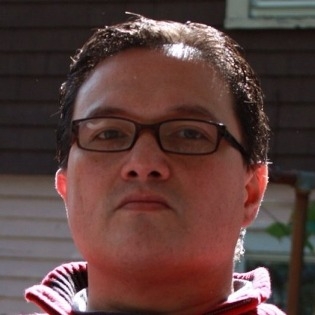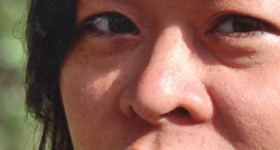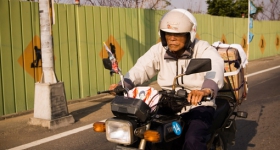The
protagonist of Juan Rader Bas’s Back
Kicks and Broken Promises is the stalwart Ricky Gilbert, the adopted Filipino
American son of two white Americans, Warren and Christine. Together with his
sister, Melanie, the adopted Chinese daughter, the family migrates from
Singapore to New Jersey, a journey that leaves Ricky adrift in a community that
can’t make sense of him. “You’re freakin’ us out a little,” one of the boys at
school says to him during his first month in Jersey, “We can’t seem to sort you
out …We’ve got Indian kids here and Orientals of all kinds, too. But, Ricky,
you’re kind of all over the place.” As Ricky struggles to find his place, a letter
from his Uncle Manny in the Philippines shakes up his already-fractured home
life.
Shaken
by his Uncle Manny’s revelation, Ricky dives into the world of tae kwon do,
where he works out his anger through a series of tournaments and championships.
As Ricky’s skills improve, he starts to feel a certain comfort, what Ricky
calls “the intangible something.” The solace he gains from tae kwon do,
however, is short-lived; Manny dies of cancer and his mother reveals that she
has HIV. Meanwhile, his relationship with his father worsens. When Ricky’s
mother passes away, Ricky returns to the Philippines to explore his heritage.
There he meets his estranged family, resulting in a fraught reunion that forces
him to come face-to-face with the past he has left behind and decide once and
for all where his place is.
There
are some admirable things about Bas’s book. Voice is one of them. Whether he is
in Singapore, New Jersey or the Philippines, Ricky’s voice is matter-of-fact
and casually stoic. It stays true to the voice of an adolescent boy while
avoiding self-exoticization. Take this description of a food court a few days
before leaving Singapore. “I almost suggested a change of plans,” Ricky says
when deciding what to eat at a mall in Singapore. “Bag McDonald’s and hit the
outdoor food court at Newton Circus but this was our thing so I didn’t. There
was still plenty of time for prawn curry, chicken rice and banana shake. I
wasn’t leaving for a month yet.”
The characters
themselves are fundamentally interesting. Ricky is a physically attractive
jock, a welcome relief from the emasculated nerds that dominate the media’s
portrayal of Asian Americans. Ricky’s mother, Christine, moves from Singapore
to the United States and tries to raise her children while battling the
often-stigmatized HIV virus. I appreciated the thoughtful premise behind her
character.
And yet,
good premises are not enough. Other aspects of Back Kicks were developed with less attention to detail resulting
in the story's falling flat. I wanted to empathize with Ricky but found that the text
pulled away from exploring key emotional moments in ways that made it
difficult for me to understand the character’s experience.

Juan Rader Bas
Take,
for example, the critical moment when Ricky finds out who his real father is:
“It’s time for him to know the truth, Christine,” Warren intones ominously.”
The following scene, a point of high drama for Ricky (and also for the reader)
is then completely skipped. Instead of seeing Ricky reacting in the moment that
he learns about his parents’ secret and viscerally feeling his anguish, we
instead are treated to a scene the morning after where Ricky lashes out at his
sister, Melanie, who inexplicably knows all about her parents’ secret. The
terrible information is revealed through a rather clumsy outburst from Melanie.
“What was I supposed to say? ‘Hi Ricky. By the way, you’re not actually adopted
like me.’”
Another disappointing
emotional blackout occurs when we learn that Ricky’s mother has HIV. Once
again, instead of allowing the reader to see what happens when Ricky finds out
about his mother in the moment, we
are treated to a rather banal exchange between Ricky and his best friend, Max,
after the fact:
“HIV.
That turns into AIDS, right?”I nodded. “Yeah.”
“But, that’s a gay disease!
Dude, your mom’s not gay!”“It’s not just gays who get it, apparently.
It’s a virus that somehow gets into your body and messes up your immune system
until your body breaks down and you die.”“Oh man. So, your mom’s
just, like, going to wither away and shit?”“Basically.”
True-to-life
dialogue? Perhaps. One could forgive the odd pacing if Ricky’s emotions were
detailed instead of assumed, but unfortunately that emotional processing is
absent and so, unfortunately, is the reader’s ability to empathize.
This
problem happens even when moments are rendered in-scene. When Ricky gets
accepted into UC Berkeley, which apparently is his first choice school, we get
a lot of detail about everyone else’s reactions except his own. This is
immediately followed by the news that Manny passed away from “complications
with pneumonia.” Ricky just got into his top choice for university. We learn
that his dear uncle just died. Both are two emotionally-rich events and while
there is strong detailing around his mother’s reaction to the news, Ricky’s
only response is “I thought he had
cancer. Do cancer patients get pneumonia?” The lack of detail about what
makes these events especially meaningful for Ricky transforms what could be emotionally
significant moments into melodrama.
Which is
a shame, because Back Kicks has the kernel
of a great Filipino American coming-of-age story. The shape of the story is
there as is the character groundwork. Too bad it fails fully to deliver.
Born in Baguio City, G. Justin Hulog grew up in California
before leaving home to study Comparative Literature at Columbia University. He
writes a bog called The Palay that contains reflections on ruined gods, forgotten spaces and Filipino
cuisine.









Comments